Unveiling the Earliest Galaxies and Super-massive Black Holes with JWST
Steven Finkelstein
(UT Austin)
Dec 5, 2023 3:30 PM
Location: Bell Room
TSI Seminar
Title: Unveiling the Earliest Galaxies and Super-massive Black Holes with JWST
Abstract:
Pushing the Hubble Space Telescope to its limits at the end of the last decade has allowed astronomers to view the tip of the cosmic iceberg at a time only 500 Myr after the Big Bang. While a few candidate galaxies were found, significant questions about the onset and evolution of the earliest galaxies persisted. The launch of JWST has opened up this epoch to direct and detailed observation by providing a significant leap in our ability to study the entire epoch of reionization due to its redder sensitivity and spectroscopic capabilities. The Cosmic Evolution Early Release Science (CEERS) and Next Generation Deep Extragalactic Exploratory Probe (NGDEEP) programs have enabled one of our first looks into this epoch, finding that galaxies at these early times are more abundant than predicted by most simulations. This hints at not only an early onset of galaxy formation, but that stars are forming differently at these early times. The CEERS spectroscopic program has shown that photometric redshifts *work*, with a high fraction of spectroscopic confirmations, and only one (interesting, yet rare) case of contamination. These data have also significantly improve our ability to identify early growing supermassive black holes, showing that they appear (relatively) frequently at high-redshift, including a remarkable AGN at z=8.7. These observations pushing models of early black hole growth, implying that massive seeds and/or super-Eddington accretion are needed at early times.

